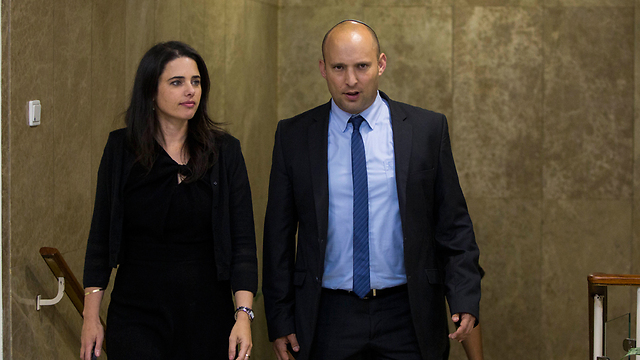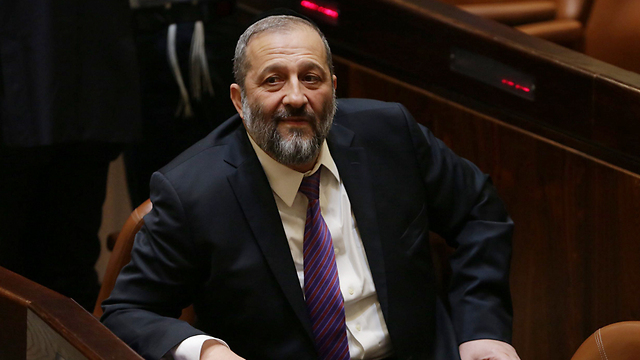
Government strikes down conversions reform
Despite objections from Bayit Yehudi, ministers vote to cancel legislation meant to enable less strict conversions to Judaism, give Shas authority over rabbinical courts.
The government struck down on Sunday a reform that was meant to enable easier conversions to Judaism, essentially ensuring the Chief Rabbinate and ultra-Orthodox sector will maintain complete control over state-recognized conversions.
Education Minister Naftali Bennett and fellow Bayit Yehudi minister Ayelet Shaked objected to the decision and voted against it, but the government still had the majority it needed to pass it.
During the discussion that preceded the vote, Prime Minister Benjamin Netanyahu asked Bennett not to "separate himself" from the government's decision and vote in favor of cancelling the reform, saying the decision was a result of a coalition agreement with ultra-Orthodox parties Shas and United Torah Judaism.

The conversions reform, one of the flagship reforms of the previous government, was never implemented because of objection from the Chief Rabbinate.
The reform, a ministerial compromise following a bill initiated by former MK Elazar Stern (Hatnua), stipulated that the chief rabbi of each Israeli city would be able to form and head a conversion court, pending conditions to be set by the chief rabbinate. This was meant to greatly increase the number of conversion courts from the four existing state-recognized Orthodox bodies.
Israel has some 364,000 citizens defined as "religionless," the bulk of whom immigrated from the former Soviet Union. They are not considered Jewish under the strict definition of Jewish law, despite most having lineage of the religion, but they are still considered Israeli by the state.
Advocates of the reform hoped it would encourage the "religionless" Israelis to become Jewish.
Critics say Israel's conversion courts, overseen by the ultra-Orthodox Chief Rabbinate, are overly stringent and discourage potential converts.

According to an alternative to the reform, new courts dealing with state-recognized conversions will adhere to Jewish law. The judges will be appointed by the Chief Rabbinate, not before receiving a recommendation from the president of the Supreme Rabbinical Court (currently Rabbi Yitzhak Yosef) and two sitting conversion judges.
Jewish Agency chairman Natan Sharansky decried the decision to cancel the reform.
"The establishment of the local courts sought to address the needs of tens of thousands of immigrants and their children who require conversion due to their desire to join the Jewish people in a more complete and recognized manner," he said.
"We cannot accept the fact that a matter so vital to the future of the Jewish people and to Israel's existence as a Jewish state is subject entirely to the configuration of the coalition at any given time and to government decisions adopted and then canceled after each election cycle," he added, noting the Jewish Agency will continue acting through other means to preserve Israel's Jewish character.
ITIM, an organization that provides advice and help to people challenged by Israel's religious bureaucracy, and that helped formulating the cancelled conversions reform, condemned the government decision.
"The new government has given the keys of entry to the Jewish people to a group of people that do not recognize the value of the State of Israel's Jewish identity, and only see the value in exilic and isolationist Judaism," the organization said. "With this, the government spits in the face of hundreds of thousands of 'religionless' who need conversion. The government is, in fact, giving up on completing the realizing of the dream of the ingathering of the Jewish exiles in their homeland, while sending us a hundred years back in time. Those who care about the country's Jewish identity need to take care of the public's interests, and not those of a certain group in the rabbinate. ITIM will continue the fight for open conversions, attuned to the public's needs, with or without the government's cooperation."
Mickey Gitzin, the executive-director of Israel Hofshit (Free Israel) said following the decision, "We took one step forward only to take two steps back in the areas of religion and state. Today, more than ever, we realize that the right to the freedom of religion will not be given to Israeli citizens by its representatives, quite the contrary."
AFP contributed to this report.











